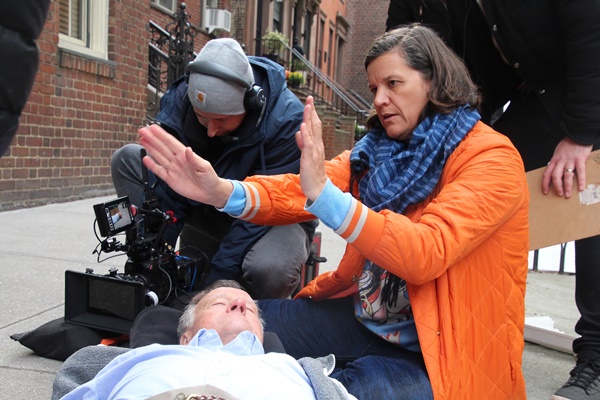
On paper, this unconventional but ultimately humane documentary sounds like the strangest kind of tribute. After years of watching octogenarian Dick Johnson decline both physically and mentally, his daughter, director Kirsten Johnson, takes matters into her own hands. Utilizing a crew that includes expert stuntpersons and special effects artists, she films Dick’s death multiple times in a variety of ways and receives his blessing and active participation as well.
Some scenes are more whimsical in nature than others. The very first involves a falling air conditioner on the streets of Manhattan, but there are also deaths as mundane as a fall down a steep flight of stairs. The results, which the camera frequently lingers on, are uniformly realistic and at times uncomfortable to watch, but Kirsten isn’t an especially morbid person. Her motivation is less about killing her father than showing him alive and well again after each episode. By killing him so many times, she hopes to help him defy death.
For his part, Dick seems game for whatever his daughter cooks up, even as her inspiration gradually shifts from the dangers to her father in everyday life to how he experiences the world. An especially surreal set piece stems from his waking up in an unfamiliar place, with no memory of how he got there. But there are also happy respites, including a makeshift heaven Kirsten films her father going to. Some of the garish touches border on the bizarre; for example, the face of Dick’s late wife (Kirsten’s mother) appears as a black-and-white photograph on a different woman’s body, but what the sequence really conveys is that he and Kirsten are two peas from the same pod, having compatible sensibilities.
The central conflict lies is in how death can only be momentarily forgotten. It’s never long before reminders of her father’s mortality rear their ugly head, and whenever they do, they pull the narrative in thought-provoking, sometimes profound directions. The director’s last feature, Cameraperson (2016), weaved together unused footage from a career’s worth of cinematography assignments in a stream of consciousness manner, and her work this time around is no less fluid. At one point, witnessing her father’s cognitive decline leads Kirsten to meditate on her mother, who met a fate similar to what Dick appears in line for and whom she never had a chance to document via film.
While the running joke involves never knowing when the artifice will turn into reality, that alone wouldn’t be enough to carry the film. What makes it compelling is the father and daughter relationship. As we observe Dick and Kirsten somehow sharing a one-bedroom apartment in New York City, it’s clear they accept each other. Kirsten never tries to get Dick to moderate his love of treats such as chocolate cake, even though he previously suffered a serious heart attack. Similarly, she has an unorthodox living arrangement regarding her two sons and their respective fathers that he never comments on.
Over the course of the film, we come to empathize with both. It’s especially easy to do so in the case of Dick, as early on we get a sense of the highly independent life he once led in Seattle, which included having a thriving psychiatry practice, a church-based community, and a stately home. All of these are gradually stripped away as his mental faculties fail, and his emotional reactions to these losses are devastating to witness. Yet while his long-term outlook may be bleak, he soldiers on, creating a new life for himself in New York and never losing his ability to find humor in things.
Kirsten, meanwhile, falls into a parental caretaker role that isn’t exactly new in movies. (See Tamara Jenkins’s The Savages from 2007 for a relatively recent fictional example, while the 2020 Sundance Film Festival, where Dick Johnson Is Dead premiered, featured numerous movies with this subject.) What is unique here is the lack of negative emotional baggage. Kirsten acts from a place of pure love, which doesn’t necessarily make things any easier.
Even though she’s behind the camera, we discern the effort to protect his feelings as she has to explain decisions he isn’t going to like. She’s patient with him and will even put down the camera in mid-shot to console him. As both a daughter and filmmaker, she’s doing the best she can to manage the tricky balancing act of protecting Dick’s dignity while filming the tragedy of his situation.
















Leave A Comment